“The Fires of Pompeii,” a celebrated episode from the fourth series of the revived Doctor Who, originally aired in 2008 and remains a fan favorite for its compelling narrative, historical setting, and profound ethical questions. As part of our ongoing exploration of the best stories from the Doctor Who universe, this week we delve into this particular episode to understand why it resonates so deeply with audiences and critics alike.
The episode throws the Doctor and Donna Noble into the heart of ancient Pompeii on the eve of the infamous volcanic eruption of Mount Vesuvius. This premise immediately sets up a significant moral quandary: can the Doctor, a figure known for saving worlds and altering timelines, stand by and watch as thousands perish in a natural disaster? This question becomes the crux of “The Fires of Pompeii,” pushing both the Doctor and his companion to confront the limitations of their power and the very nature of time itself.
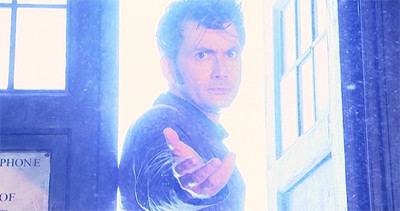 Come with me if you want to live…
Come with me if you want to live…
The narrative cleverly uses the historical backdrop not just as set dressing, but as an integral part of the thematic exploration. The episode opens with a light tone, as the Doctor and Donna marvel at the sights and sounds of Pompeii, engaging in witty banter and historical tourism. However, the levity quickly dissipates as the impending doom of the volcano looms large. Donna, ever the compassionate human, immediately questions why the Doctor, who routinely saves civilizations from alien invasions, cannot intervene to save the people of Pompeii.
This confrontation highlights a recurring theme within Doctor Who: the Doctor’s complex relationship with history. He frequently intervenes in events involving extraterrestrial threats, but natural disasters are typically considered beyond his purview. The episode forces both the characters and the audience to consider why this distinction exists. Is it simply a matter of practicality, or is there a deeper ethical principle at play? The Doctor’s explanation hinges on the concept of “fixed points in history,” events that are immutable and cannot be altered without catastrophic consequences to the timeline.
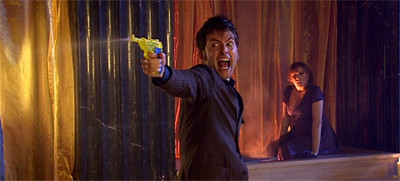 He’s got a water gun, and he’s not afraid to use it…
He’s got a water gun, and he’s not afraid to use it…
However, this explanation is met with skepticism, primarily from Donna, who voices the audience’s logical questions. “Fixed point? Says who?” she challenges, to which the Doctor can only lamely reply, “Says me.” This moment of narrative slight-of-hand acknowledges the somewhat arbitrary nature of the “fixed point” concept. It’s a dramatic necessity, a plot device to raise the stakes and force the Doctor into an uncomfortable position. The episode doesn’t shy away from these logical inconsistencies, instead using Donna’s questioning to explore them further. She rightly points out the Doctor’s previous interventions in her own life and in other historical events, questioning the seemingly arbitrary line drawn at Pompeii.
The brilliance of “The Fires of Pompeii” lies in how it navigates this ethical maze. Instead of providing easy answers, it delves deeper into the moral gray areas. The script, penned by James Moran, skillfully shifts the central question from “why can’t the Doctor save Pompeii?” to “how can the Doctor be complicit in the destruction of Pompeii?” This subtle but crucial shift reframes the Doctor’s role from a passive observer to an active participant, albeit in a tragic necessity.
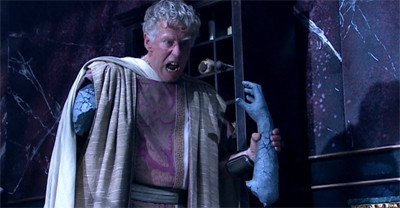 Keep it handy…
Keep it handy…
The episode introduces the Pyroviles, rock-like alien creatures who plan to use the volcanic eruption to convert Earth into a new homeworld. This alien threat provides the narrative justification for the Doctor’s intervention. He cannot save Pompeii from the volcano, but he can prevent the Pyroviles from using the eruption to their advantage, which would have far-reaching and potentially devastating consequences for the entire planet. This sets up a classic “lesser of two evils” scenario, forcing the Doctor to make an agonizing choice.
In a powerful parallel to “The Parting of the Ways,” another pivotal episode in the Davies era, the Doctor is once again faced with the prospect of mass destruction to prevent a greater catastrophe. He must use the volcanic energy to defeat the Pyroviles, an act that will inevitably hasten and intensify the eruption of Vesuvius, sealing Pompeii’s fate. This moment underscores the heavy burden the Doctor carries and the difficult decisions he is often forced to make.
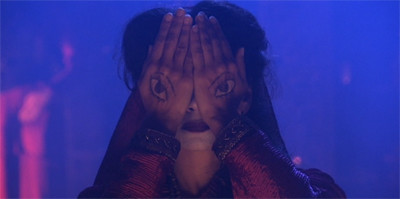 They’ll never see eye-to-eye…
They’ll never see eye-to-eye…
Crucially, “The Fires of Pompeii” highlights the indispensable role of the companion, particularly Donna Noble. While previous companions had questioned the Doctor’s actions and the rules of time travel, Donna pushes back with a unique force and moral clarity. She is not merely curious about the mechanics of time travel; she is deeply concerned with the ethical implications of the Doctor’s choices. Her persistent questioning and emotional appeals force the Doctor to confront the human cost of his decisions in a way that is rarely seen in the series.
Donna’s strength lies in her humanity. She represents the audience’s perspective, grounding the Doctor’s cosmic and often detached view of events. She sees the individual lives at stake, the human tragedy unfolding in Pompeii, and refuses to let the Doctor simply walk away. Her emotional investment and moral outrage are not just character traits; they are essential to the episode’s thematic depth. She is the moral compass, guiding the Doctor back to his core values and reminding him of the importance of individual lives amidst grand historical narratives.
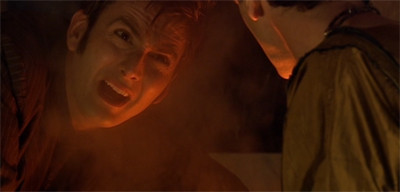 Letting off steam…
Letting off steam…
Catherine Tate’s performance as Donna is particularly noteworthy in this episode. Initially known for her comedic roles, Tate showcases her dramatic range, conveying Donna’s horror, compassion, and unwavering moral conviction with remarkable depth. Her chemistry with David Tennant is palpable, creating a dynamic where Donna is not just a sidekick but a true equal, challenging and supporting the Doctor in equal measure.
Beyond the ethical and character-driven narrative, “The Fires of Pompeii” is also a visually stunning episode. The production design is lavish, effectively recreating the ancient Roman city. The sets, costumes, and CGI work together seamlessly to transport viewers to Pompeii on the brink of disaster. The Pyroviles, with their Greco-Roman helmet-like heads and lava-infused bodies, are memorable and visually striking monsters, blending the historical setting with the science fiction elements of Doctor Who.
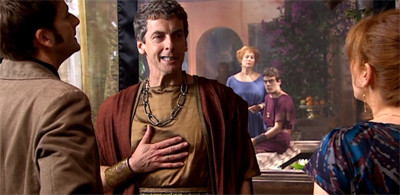 Doctor, Doctor…
Doctor, Doctor…
The episode is also rich in subtle callbacks and foreshadowing, a hallmark of the Russell T Davies era. References to classic Doctor Who serials like “The Romans” are sprinkled throughout, rewarding long-time fans. Furthermore, the episode features guest appearances by Peter Capaldi and Karen Gillan in roles predating their later iconic roles as the Twelfth Doctor and companion Amy Pond, respectively. This adds an extra layer of intrigue for viewers revisiting the episode knowing their future Doctor Who trajectories.
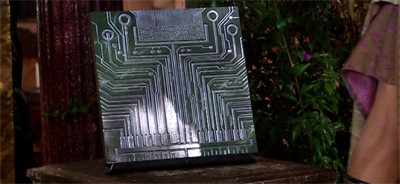 A historical closed circuit…
A historical closed circuit…
In conclusion, “The Fires of Pompeii” stands out as a powerful and thought-provoking episode of Doctor Who. It masterfully blends historical drama with science fiction, using the backdrop of Pompeii’s destruction to explore complex ethical questions about intervention, destiny, and the Doctor’s role in the universe. Donna Noble’s character is central to the episode’s success, serving as the audience’s voice and the Doctor’s moral anchor. Her dynamic with the Doctor elevates the narrative beyond a simple monster-of-the-week story, transforming it into a profound exploration of humanity, compassion, and the agonizing choices that come with the power to travel through time. “The Fires of Pompeii” is not just a thrilling adventure; it’s a deeply human story that continues to resonate with viewers, prompting reflection on our own moral responsibilities in the face of history and disaster.
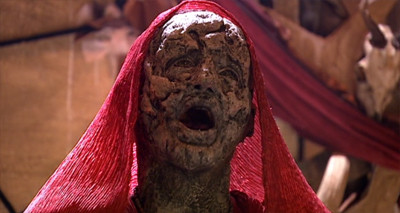 Heart (and other organs) of stone…
Heart (and other organs) of stone…
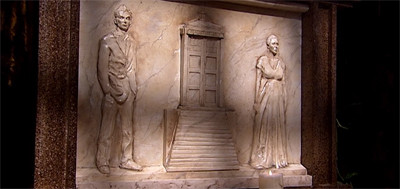 Oh my gods…
Oh my gods…
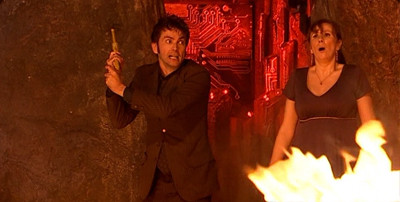 All fired up…
All fired up…
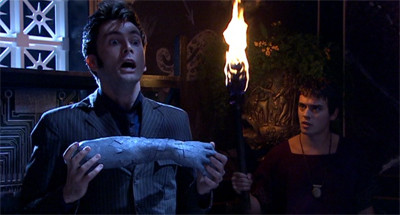 He’s mostly armless…
He’s mostly armless…
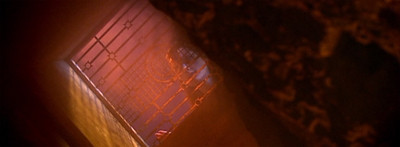 These references don’t grate…
These references don’t grate…
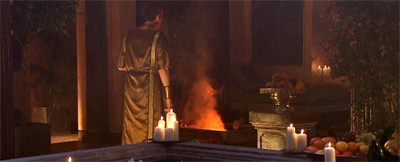 Venting his frustrations…
Venting his frustrations…
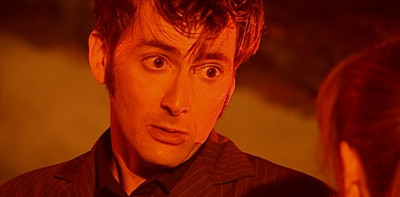 Caving to Donna’s pressure…
Caving to Donna’s pressure…
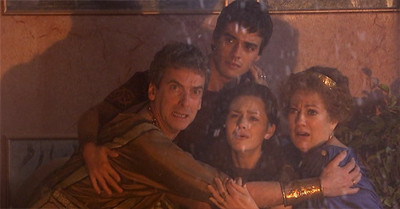 A heated family discussion…
A heated family discussion…
